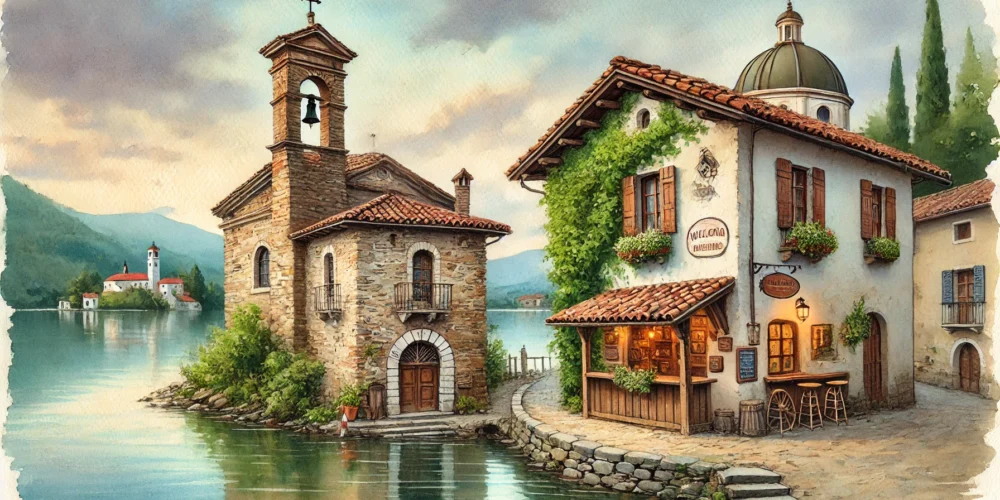The struggle for meaning is both peculiar and personal

While travelling in Italy last year, I came across an interesting juxtaposition. In a small, rustic village, there was a modest, very charming chapel. Right next to it was the village tavern.
I paused to reflect. The human being truly has a need for escape from life’s myriad difficulties. Our lives are full of challenges and setbacks, sufferings and reversals. They can also be endlessly banal. And so we seek escape through different doors: a temporary suspension of reality if we take one; and the hope for a higher meaning beyond our daily grind if we take another.
The two buildings I saw were both ancient, centuries old. When life has become overwhelming, each has offered solace: one perhaps for the senses, the other perhaps for the soul. One invites us to find meaning in suffering; the other to forget the suffering for a few hours. Each building has its own sense of community, with familiar faces and shared values. Each even undoubtedly has its share of confessions, whispered to a priest in one, murmured to the barkeep in the other!
As I gazed upon the two doors, I also realized that the two buildings must have shared patrons. Many humans no doubt seek comfort or succour in both establishments. That brought to mind the famous couplet by Mirza Ghalib, perhaps the most revered poet of Urdu literature, known for his witty philosophical whimsies.
“Where, Ghalib, is the tavern’s door, and where ought the preacher to be? I know only this: that yesterday as I left, he was entering after me.”
That translation of the couplet highlights Ghalib’s literal intent: to pinpoint the irony of the preacher who condemns the tavern-goer while being drawn there himself. We all know many pastors and pundits who have espoused piety in the sweetest tones, while secretly harbouring every material human desire. With Ghalib, however, we must go deeper, beyond the literal interpretation. Many thinkers and scholars have reflected on the duality of human nature. Virtue and vice are not as clear-cut as we are often taught. We aspire to be creatures of higher calling; but we are dogged every day by our more base needs.
Spotting the preacher in the pub—a place of revelry, and, for many, questionable life choices—is akin to spotting your dentist stocking up on candy at the supermarket, or catching your personal trainer munching on a doughnut! It’s ironic, but it should also provoke deeper thought.
Too many humans, especially those in leadership, are hiding behind the guise of piety and fake virtue. If I attack you, I am fighting righteously; if you attack me, you are an evil terrorist. If I am in power, it is because of divine intervention; if you ascend higher than me, it is the devil’s work. If I receive massive rewards, it is because of my hard work and unique contribution; if you ask for more, you are naive and unschooled in reality.
All humans are imperfect. We have deep yearnings to be better than we are; but we also have material needs that keep us stuck in the mud of our existence. We wish to be more kind and understanding, yet we remain trapped in daily resentments towards others. We wish to have healthier, fitter bodies, but that slice of cake or glass of wine mesmerises us. We can go from prayerful meditation to unfettered outbursts in a few seconds. We are quirky, flawed creatures capable of near-divinity one moment, and weak capitulation the next.
And so my chapel and tavern being next to each other is poignantly ironic. The two places of congregation reflect the dual nature of those who enter them; they depict the daily battle that rages in even the best of us; they remind us that our lives are both meaningful and meaningless.
Too many of us abandon our own discernment and place ourselves in the hands of others: priests who require adherence to impossible strictures; bartenders who invite us to lose ourselves in their bottles; profiteers who sell us the lie that buying more of their products is the path to our salvation; collectivists who ask us to give up our freedoms and choices to create an imaginary utopia.
Giving up all agency is never the answer. We must remain masters of our own vessels, no matter how choppy the waters. Blind faith in ritual or leadership will not yield answers; nor will losing ourselves to vapid merriment and obsessive consumption. The search for meaning is a personal and peculiar struggle. We only get better by putting in the work, slowly and repeatedly.
The deeper point concerns the need to understand the totality of the human being, and to avoid both moral hypocrisy and knee-jerk condemnation. We’re all troubled creatures trying to find a better way in our lives; we’re all stumbling and reversing course from time to time; we should all accept the struggle. The witticisms of poets and humorists are perhaps essential tools in this troubled journey. Because what also makes us human is the ability to laugh at ourselves.
(Sunday Nation, 20 October 2024)

Buy Sunny Bindra's new book
The X in CX
here »
Popular Posts
- Make this your year of being boringJanuary 4, 2026
- Snakes and Ladders, AKA your lifeJanuary 25, 2026
- Can we please stop with the corporate jargon?January 11, 2026
- The man who passed by one markJanuary 18, 2026
- Pretty isn’t the productFebruary 1, 2026















